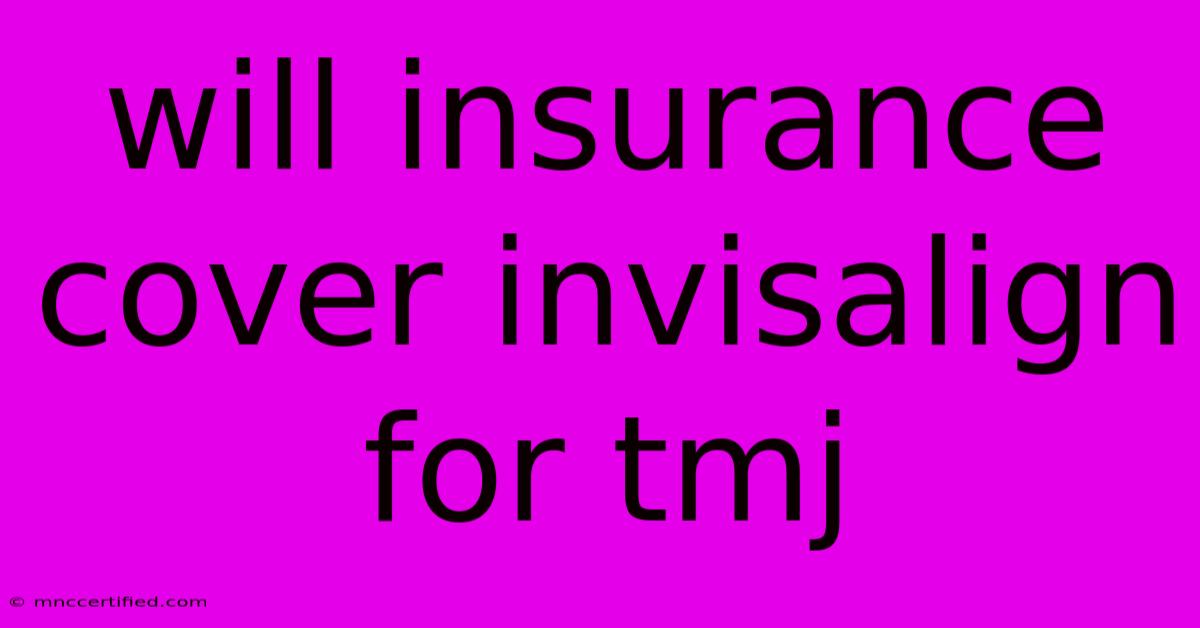Will Insurance Cover Invisalign For Tmj

Table of Contents
Will Insurance Cover Invisalign for TMJ? A Comprehensive Guide
Temporomandibular joint disorder (TMJ) is a common condition affecting the jaw joint and surrounding muscles. While Invisalign is primarily known for straightening teeth, it can also be a potential treatment option for TMJ. But will insurance cover Invisalign for TMJ? The answer, unfortunately, is not straightforward.
Understanding the Complexity
Insurance coverage for Invisalign for TMJ depends on various factors, including:
- Your insurance plan: Each plan has specific guidelines regarding coverage for orthodontic treatment, including Invisalign.
- Your diagnosis: Insurance companies typically require a diagnosis of TMJ from a qualified dental professional.
- The severity of your TMJ: The severity of your symptoms and the necessity of Invisalign for treatment will be considered.
- The reason for treatment: Is Invisalign being used to address TMJ pain, improve bite alignment, or both?
When Insurance Might Cover Invisalign for TMJ:
While not guaranteed, insurance coverage for Invisalign for TMJ is more likely in specific circumstances:
- Severe TMJ symptoms: If your TMJ pain significantly affects your daily life, and Invisalign is deemed a necessary treatment by your dentist, your insurance might cover it.
- Treatment for bite problems: If Invisalign is used to address underlying bite issues that contribute to your TMJ pain, your insurance might cover it as a medically necessary procedure.
- Pre-existing orthodontic conditions: If you have a history of orthodontic issues, and TMJ is a related complication, your insurance might cover Invisalign as a continuation of your previous treatment.
How to Increase Your Chances of Coverage:
- Consult with your dentist: Discuss your TMJ symptoms and treatment options with your dentist. They can provide documentation for your insurance company outlining the necessity of Invisalign for your condition.
- Get a proper diagnosis: Seek a diagnosis from a qualified dental professional specializing in TMJ disorders. This will strengthen your case for insurance coverage.
- Consider a pre-authorization: Some insurance plans require pre-authorization for orthodontic treatment. Contact your insurance company to understand their specific requirements.
- Explore alternative treatment options: Depending on your insurance coverage, alternative TMJ treatments, like physical therapy or bite splints, might be covered.
The Bottom Line:
While insurance coverage for Invisalign for TMJ isn't guaranteed, it's worth exploring. Be prepared to provide documentation and communicate effectively with your insurance company. Remember that your individual situation and insurance plan will determine the final outcome.
If you're considering Invisalign for TMJ, reach out to your dentist to discuss your options and the potential for insurance coverage.

Thank you for visiting our website wich cover about Will Insurance Cover Invisalign For Tmj. We hope the information provided has been useful to you. Feel free to contact us if you have any questions or need further assistance. See you next time and dont miss to bookmark.
Featured Posts
-
76ers Vs Lakers Odds And Prediction Friday
Nov 09, 2024
-
Sanju Samson Century Leads India To T20 I Victory
Nov 09, 2024
-
Duke Freshmen Lead Big Win Over Army
Nov 09, 2024
-
Odi Series Pakistan Claims First Win In Australia
Nov 09, 2024
-
Friday Night Football Best Bets And Odds
Nov 09, 2024